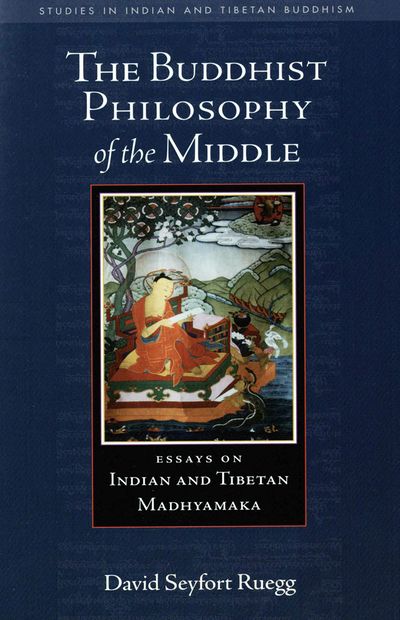- Foreword by Tom Tillemans ix
- Preface xiii
- Abbreviations xix
- 1. Mathematical and Linguistic Models in Indian Thought: The Case of Zero
and Śūnyatā (1978) 1 - 2. Towards a Chronology of the Madhyamaka School (1982) 13
- 3. The Uses of the Four Positions of the Catuṣkoṭi and the Problem of the
Description of Reality in Mahāyāna Buddhism (1977) 37- I. The Four Positions in Early Buddhist Thought37
- II. The Uses of the Catuṣkoṭi in the Madhyamaka40
- III. Conjunction and Negation of Opposed Terms in Vijñānavāda
Definitions of Reality 67 - IV. Negation of Opposed Terms in the Description of the Absolute in the
Ratnagotravibhāga 81 - V. The Vātsīputrīya Conception of the Indeterminate 84
- Appendix I. Commentarial Interpretations of Mūlamadhyamakakārikā
xviii.8 86 - Appendix II. Some Modern Interpretations of the Catuṣkoṭi 89
- Appendix III. The Logical Error of Negation of the Antecedent and the
Mūlamadhyamakakārikās 109 - Bibliography 111
- 4. Le Dharmadhātustava de Nāgārjuna (1971) 113
- 5. On the Authorship of Some Works Ascribed to Bhā(va)viveka/Bhavya
(1990) 145 - 6. The Svātantrika-Prāsaṅgika Distinction in the History of Madhyamaka
Though (2006) 159 - 7. Purport, Implicature, and Presupposition: Sanskrit abhiprāya and Tibetan
dgongs pa / dgongs gzhi as Hermeneutical Concepts (1985) 195 - 8. An Indian Source for the Tibetan Hermeneutical Term dgongs gzhi,
"Intentional Ground" (1998) 213 - 9. Some Reflections on the Place of Philosophy in the Study of Buddhism
(1995) 217 - 10. On the Tibetan Historiography and Doxography of the "Great Debate
of Bsam yas" (1992) 253 - 11. Autour du Lta ba'i khyad par de Ye shes sde (1979) 267
- 12. The Jo nang pas; A School of Buddhist Ontologists According to the
Crystal Mirror of Philosophical Doctrines (Grub mtha' shel gyi me long) (1963) 289 - 13. A Karma Bka' brgyud Work on the Lineages and Traditions of the Indo-Tibetan dbu ma (Madhyamaka) (1988) 323
- 14. La Pensée Tibétaine (accompagné d'une traduction du Rten 'brel bstod pa legs bshad snying po de Tsong kha pa) (1989) 357
- 15. The Indian and the Indic in Tibetan Cultural History, and Tsong kha pa's Achievement as a Scholar and Thinker: An Essay on the Concepts of "Buddhism in Tibet" and "Tibetan Buddhism" (2004) 375
- 1. Mathematical and Linguistic Models in Indian Thought: The Case of Zero
- English Glossary of Selected Terms 399
- Publications by David Seyfort Ruegg 407
- Indexes 419
No edit summary |
No edit summary |
||
| Line 26: | Line 26: | ||
** {{i|8. An Indian Source for the Tibetan Hermeneutical Term ''dgongs gzhi'',<br> "Intentional Ground" (1998) |213}} | ** {{i|8. An Indian Source for the Tibetan Hermeneutical Term ''dgongs gzhi'',<br> "Intentional Ground" (1998) |213}} | ||
** {{i|9. Some Reflections on the Place of Philosophy in the Study of Buddhism<br> (1995) |217}} | ** {{i|9. Some Reflections on the Place of Philosophy in the Study of Buddhism<br> (1995) |217}} | ||
** {{i|10. On the Tibetan Historiography and Doxography of the "Great Debate<br> of Bsam yas" (1992) |253}} | ** {{i|10. On the Tibetan Historiography and Doxography of the "Great Debate<br> of Bsam yas" (1992) |253}} | ||
** {{i|11. Autour du ''Lta ba'i khyad par'' de Ye shes sde (1979) |267}} | ** {{i|11. Autour du ''Lta ba'i khyad par'' de Ye shes sde (1979) |267}} | ||
** {{i|12. The Jo nang pas; A School of Buddhist Ontologists According to the<br> ''Crystal Mirror of Philosophical Doctrines (Grub mtha' shel gyi me long)'' (1963)| 289}} | ** {{i|12. The Jo nang pas; A School of Buddhist Ontologists According to the<br> ''Crystal Mirror of Philosophical Doctrines (Grub mtha' shel gyi me long)'' (1963)| 289}} | ||
** {{i|13. A Karma Bka' brgyud Work on the Lineages and Traditions of the Indo-Tibetan ''dbu ma'' (Madhyamaka) (1988) |323}} | ** {{i|13. A Karma Bka' brgyud Work on the Lineages and Traditions of the Indo-Tibetan ''dbu ma'' (Madhyamaka) (1988) |323}} | ||
** {{i|14. La Pensée Tibétaine (accompagné d'une traduction du ''Rten 'brel bstod pa legs bshad snying po'' de Tsong kha pa) (1989) |357}} | ** {{i|14. La Pensée Tibétaine (accompagné d'une traduction du ''Rten 'brel bstod pa legs bshad snying po'' de Tsong kha pa) (1989) |357}} | ||
Revision as of 14:34, 2 September 2020
Madhyamaka, the "philosophy of the middle," systematized the Buddha's fundamental teaching on no-self with its profound non-essentialist reading of reality. Founded in India by Nāgārjuna in about the second century C.E., Madhyamaka philosophy went on to become the dominant strain of Buddhist thought in Tibet and exerted a profound influence on all the cultures of East Asia. Within the extensive Western scholarship inspired by this school of thought, David Seyfort Ruegg's work is unparalleled in its incisiveness, diligence, and scope. The Buddhist Philosophy of the Middle brings together Ruegg’s greatest essays on Madhyamaka, expert writings which have and will continue to contribute to our progressing understanding of this rich tradition. (Source: Wisdom Publications)
| Citation | Ruegg, David Seyfort. The Buddhist Philosophy of the Middle: Essays on Indian and Tibetan Madhyamaka. Studies in Indian and Tibetan Buddhism. Boston: Wisdom Publications, 2010. |
|---|---|


